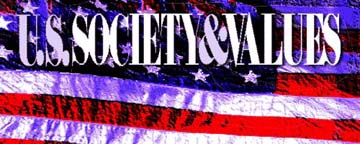Electronic Journal of the U.S. Information Agency, Volume 2, Number 1, March 1997
THE RELIGIOUS LANDSCAPE OF THE UNITED STATES
(Download Adobe Acrobat
version / zipped ASCII
version)
![]() Welcome
Welcome ![]() Contents
Contents ![]()
![]()
FROM THE EDITORS

Electronic Journal of the U.S. Information Agency, Volume 2, Number 1, March 1997
(Download Adobe Acrobat
version / zipped ASCII
version)
![]() Welcome
Welcome ![]() Contents
Contents ![]()
![]()
FROM THE EDITORS
Congress shall make no law respecting an establishment of religion, or prohibiting the free exercise thereof; or abridging the freedom of speech, or of the press; or the right of the people peaceably to assemble, and to petition the government for a redress of grievances.
The above text of the First Amendment to the U.S. Constitution, in a mere 45 words, lays out four of the most important fundamental rights of American citizens. A recent issue of USIA electronic journals (Issues of Democracy, Volume 2, Number 1, February 1997) explored a free press.
In this journal, readers are invited to consider two aspects of religious life in America, the fundamental rules of which derive from that same First Amendment:
![]() The constitutional guarantee to personal
religious freedom in American society;
The constitutional guarantee to personal
religious freedom in American society;
![]() The remarkable religious vitality of a
society which supports some 2000 different religious
denominations, and in which more than 60 percent of the citizens
can be found at least once a month in one of the almost 500,000
churches, temples and mosques which dot the landscape.
The remarkable religious vitality of a
society which supports some 2000 different religious
denominations, and in which more than 60 percent of the citizens
can be found at least once a month in one of the almost 500,000
churches, temples and mosques which dot the landscape.
A speech by President Bill Clinton begins our explorations. It alludes to the founding fathers and their remarkable ideas and achievement. It also discusses the critical role of the Supreme Court of the United States in defining a balance in what are often conflicting claims of constitutional right or protection. The President s words provide an eloquent and personal statement about his view of religion in the U.S. There can be no better place for the reader to begin the exploration of this rich and important subject.
U.S. Society &
Values
USIA Electronic Journal, Vol. 2, No. 1, March 1997